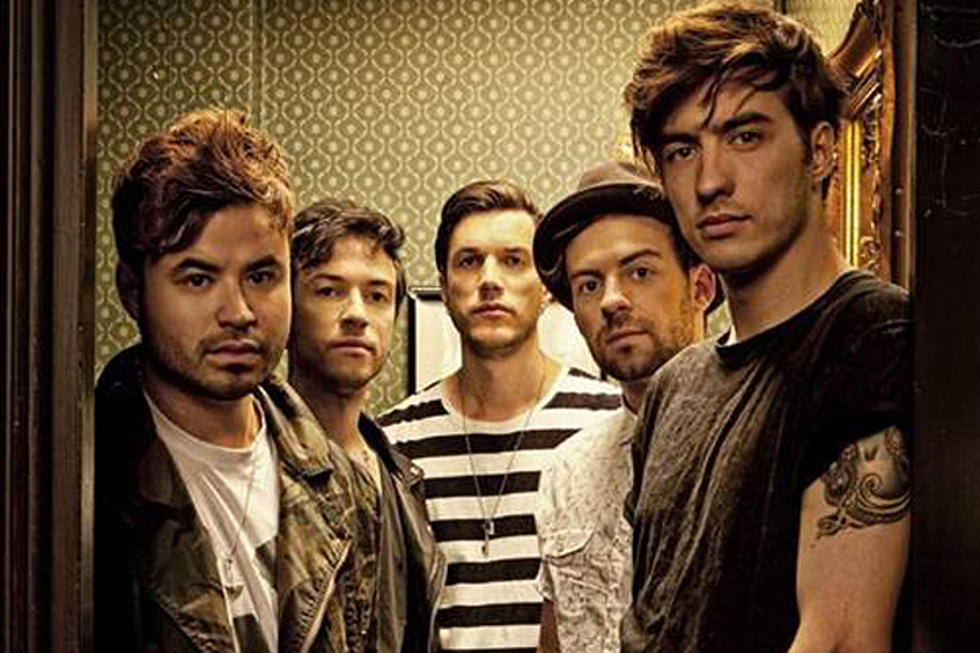
Young Guns’ Gustav Wood Talks ‘Ones And Zeros’ Album, Evolving Live Show + More
British rockers Young Guns are preparing to release their third studio album, ‘Ones and Zeros,’ which will arrive this summer. Frontman Gustav Wood recently spoke with ‘Loudwire Nights’ host Full Metal Jackie about the how the band is progressing musically, their evolving live show + more. Check out the chat below.
Gus, what's the biggest musical progression from the last two albums to the new one, Ones and Zeros?
I think all we've ever tried to do is basically just write music that we would want to listen to if we weren't writing it. I think that's kind of the best benchmark you can try and hit. One that kind of means you're always being honest. I think, really, the biggest difference for us is really that we've been a band now since the beginning of 2009 so with every record it's about, you know, we say to ourselves, “Well, how can we do this in a way that's going to keep us interested,” because we've already done what we did on the last record and we don't want to do that again.
So, for us this time, it was just about finding new ways to challenge ourselves and remain interested in writing rock music and on this record, we found that the way we wrote was quite different. We wrote a lot of the time around piano, or around synth and then it was about what can the guitars do that's really important but we're not just throwing in a thousand guitars for the sake of it. So funnily enough, I think it's probably our heaviest record, but it's also our leanest, and I think our best written record, our best written collection of songs that we've been able to put together so far.
Gus, was Ones and Zeros planned and thought out, or is it totally in the moment, creative spontaneity?
We didn't go in with any set idea, we just wanted to write music that we thought was cool and exciting to us and naturally your tastes change over the years and so what you think is cool and exciting changes as well. But it was always spontaneous. Having said that, writing a song, it can take five hours or it can take five months. You never know which one it's going to be. So if I can call taking half a year to write a song being spontaneous, then that's what it was. But every decision we made was certainly in the heat of the moment and our only motivation was to do something we thought was interesting and cool, and how can we keep rock music sounding fresh and exciting, that was a big question for us on this one.
Gus, how is the flow and dynamic of your live set changing now that you have three albums worth of material?
Well, it's funny, because it's kind of a privilege in some ways, because when we started this band, we wrote four songs and we put an EP together, and then we realized that in order to play shows, you need more than four songs, so we quickly had to write a bunch of other ones just so we could play shows. And now, it's funny, we find ourselves in the place where we argue over what songs we're gonna play and what songs we're gonna not play that night. And that's great, that's great to be able to do that because I do think that you can try and create your best set, your strongest set and maybe there's a night when you can play mostly singles, or maybe there's a night when you can kind of go into the deeper cuts, if it's like a headline show and pick some of the ones that maybe you don't get to play so often if you're doing supports.
It just means you get to have a lot more fun with it and it also means, and I hate to say this, but it also means that you don't always have to play those kind of, those songs that you first wrote when you started the band, and maybe you're not as proud of them as you are some of your newer material. So that's always good, it's always nice to get to play what you feel is your strongest collection of songs, you know. But it's important that we play what people want to hear and that's always something that we're really mindful of but it's a lot of fun. Playing these songs, let me tell you, it's the best feeling in the world; it's like starting again, in a really cool way. It's great. And so the dynamic of the set we play now is really interesting, we need to think about mixing new and old and keeping the energy up also, being out there, you kind of have peaks and troughs in the set and basically, the more material you have, the more fun you can have and the more you can create a live show, and that's where we're at now.
You were a bass player before a singer, who has understanding the mechanics and theory of an instrument enhanced you as a singer?
That's a great question. I personally hesitate to call myself a singer. The thing is that I met a bunch of guys I got on really well with and we became really good friends and they were in a band and they needed a bassist, and I was like, ‘Well, I don't really play bass, but I'll do it,’ because I grew up playing guitar. And so I did it when we joined the band, and then our singer quit, so I was like, ‘Ok, well, I'll do it until we a singer,’ and that never happened, so here we are. But I think it's really important because having played in bands and not just this band, other bands before it, I played guitar, bass, you know. I think you have to understand that obviously what a lot of people are paying attention to in music is primarily the vocal, but absolutely every single part of every song has to be important, has to be well written and has to be valid.
I think that I don't come at songwriting as a singer, I come at songwriting as a musician and as one of five musicians and we also work in a way where everybody has an equal say and an equal voice, and everyone's opinions are valid. So I like to think that I hopefully can write decent melodies and stuff, but I come to the band as not so much of a “frontman,” but really just as one of five musicians in the band. That's really important to me. I actually get really jealous, I look at the other guys rocking out on their instruments. Sometimes I think, "Ah man, that would be so fun." I have to sing. Of course you can play hungover, you can't sing hungover. You can play when you're sick, you can't sing when you're sick. I kind of enjoy both sides of the situation.
There's a lot of times you hear about singers that play different instruments in the band. It must be a crazy change to end up being front and center after being a guy behind an instrument.
I didn't know what to do with my hands. That was the big thing. I spent the first two years saying, "Oh my god what do I do with my arms? I feel like I've got four arms now because I'm not doing anything with them." When we first started, I used to just jump into the crowd and do whatever I could to just engage and have it be a visceral experience. Every minute I was standing up there I just felt really odd. It went away and now I think it's quite empowering, it's great to be able to be comfortable standing on stage and not need anything. But, some of the tracks on this record we're looking into expanding the way we play live. We're going to be swapping instruments and be doing some fun stuff on this touring cycle. I'm excited about the future, it's going to be a lot of fun.
Gus, what makes the way the guys in your band play perfect for the way you sing?
I think I'm like a traditional rock singer in some respects. I don't have a Whitney Houston range or anything, so it's really important that you work within what you can do. You work within your limits and you just try and do what you do really well. The guys really respect that and they're aware of it. I think we always try to do to make what we do make the other person in the band be as good as good they can be. We write a song and try and find where that fits most where I can sing it the most and where it sounds the most, kind of genuine.
Fundamentally, we write well together and connect with each other because we are very, very similar. Me and the rest of the guys are really good friends. That, first and foremost, before band members we're friends. So we get on and respect each other. Something in our chemistry just clicks. They write the kind of music that I want to sing to. Sometimes it's just about having fun with your friends and it doesn't need to be any more complicated than that. I think we all understand that, it just kind of works. Sometimes I can't put my finger on it, It just works. I know it works because I spent a lot of time with it not working when we were younger. When we finally got it to a place where it works, we understood what we needed to write and what we needed to do to kind of make us, as a band, sound like a good band and hopefully be a good band. We love riffs, we love melodies and we just try to shove them all together.
Thanks to Young Guns’ Gustav Wood for the interview. Young Guns will release their new album ‘Ones and Zeros’ on June 8 via Wind-Up Records. Fans can pre-order the effort here. Tune in to ‘Loudwire Nights With Full Metal Jackie and Tony LaBrie’ Monday through Friday 7PM through midnight online or on the radio. To see which stations and websites air ‘Loudwire Nights,’ click here.
Watch Young Guns Discuss Their New Album Plans at ShipRocked 2014
More From Loudwire









